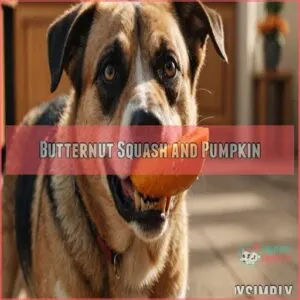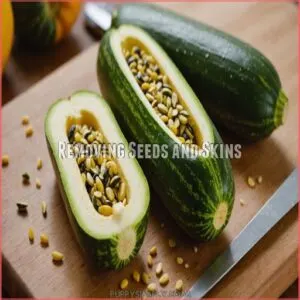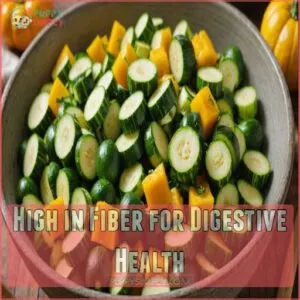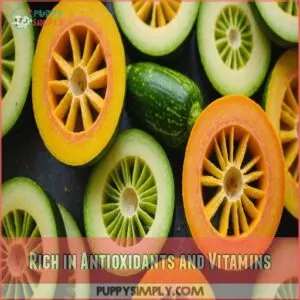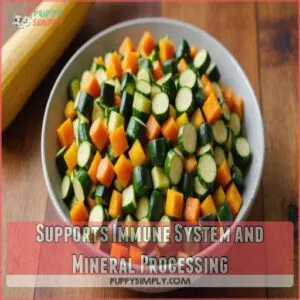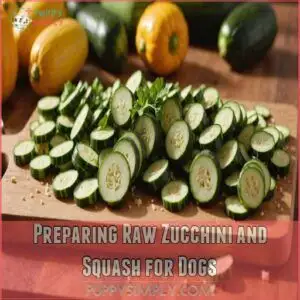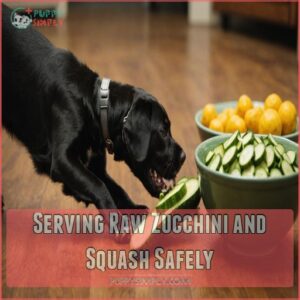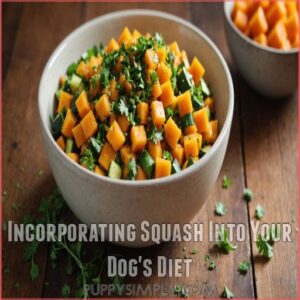This site is supported by our readers. We may earn a commission, at no cost to you, if you purchase through links.
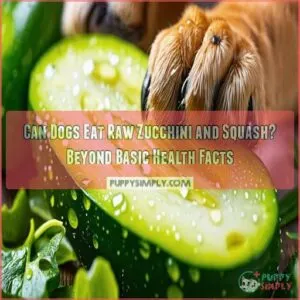 Yes, dogs can eat raw zucchini and squash, but moderation is key.
Yes, dogs can eat raw zucchini and squash, but moderation is key.
These veggies are low in calories and high in fiber, making them a healthy treat for your furry friend.
Just chop them into bite-sized pieces to avoid any choking hazards.
While zucchini and squash are safe, always remove the seeds and skin to prevent any digestive issues.
Keep an eye out for signs of tummy upset, as each dog reacts differently.
And remember, too much of a good thing can lead to gas or bloating.
Curious about preparing these safely for your pup’s next meal?
There’s more to uncover!
Table Of Contents
- Key Takeaways
- Safe Squash Varieties for Dogs
- Nutritional Benefits of Zucchini and Squash
- Preparing Raw Zucchini and Squash for Dogs
- Serving Raw Zucchini and Squash Safely
- Incorporating Squash Into Your Dog’s Diet
- Frequently Asked Questions (FAQs)
- Is raw squash and zucchini good for dogs?
- Can dogs eat zucchini with skin?
- Can dogs eat raw pumpkin and squash?
- Is zucchini good for dogs with kidney disease?
- Can dogs eat zucchini or squash leaves?
- How much raw zucchini is too much?
- Are there any allergic reactions to raw squash?
- Is raw zucchini better than cooked for dogs?
- Can puppies safely eat raw squash?
- Conclusion
Key Takeaways
- You can feed your dog raw zucchini and squash, but always remove seeds and skins to prevent digestive issues.
- Introduce these veggies gradually and in moderation to avoid gas or bloating.
- Zucchini and squash are rich in fiber and vitamins, supporting digestive health and the immune system, much like safe foods for Bichon Frises that provide essential nutrients for optimal health.
- Consult your vet before adding them to your dog’s diet, especially if your dog has pre-existing health conditions, as some dogs may have food allergies or sensitivities that can be affected by a raw diet grain-free approach. Consult your vet before adding them to your dog’s diet, especially if your dog has pre-existing health conditions.
Safe Squash Varieties for Dogs
If you’re looking for safe squash varieties for your dog, consider butternut squash, pumpkin, zucchini, and acorn squash, as they’re generally well-tolerated.
Just remember to remove seeds and skins, since these parts can be hard for dogs to digest and might cause stomach issues.
Butternut Squash and Pumpkin
You’re probably wondering, "Can my dog safely munch on butternut squash or pumpkin?"
The answer is a cautious yes!
Butternut squash and pumpkin are generally safe, offering fiber and vitamins, and share similarities with other safe vegetables like carrots, which are low in calories and rich in vitamin A.
However, steer clear of pumpkin pie filling; it contains xylitol, which is toxic to dogs.
Always remove seeds and skin before serving.
Remember, moderation is key, and if you’re unsure, check with your vet.
Looking for yummy squash recipes for your furry friend?
Your vet can also offer advice on appropriate serving sizes and how to manage potential dog allergies.
Zucchini and Acorn Squash
Switching gears from butternut squash and pumpkin, let’s chat about zucchini and acorn squash.
Zucchini, being easy on a dog’s stomach, ranks high for dog safety.
It’s packed with fiber and other goodies, making it a great treat.
Acorn squash also packs a punch, loaded with vitamins.
Remember, moderation is key; small serving sizes help your pup enjoy squash benefits without upset.
Removing Seeds and Skins
To keep things safe for your pooch, removing seeds and skins from raw zucchini and squash is a must.
Think of these parts like the unwanted guests at a party—they serve no good purpose for your dog’s health.
Seeds can be a choking hazard, while skins might cause digestive upset.
By prepping squash properly, you’re ensuring a safer, happier eating experience for your furry friend, and for other vegetables like carrots and green beans, it’s best to check the ultimate guide to safe foods.
Nutritional Benefits of Zucchini and Squash
You mightn’t think of zucchini and squash as superfoods for your dog, but these veggies pack a punch.
They’re loaded with fiber for digestive health and vitamins that support immune function and aid in mineral processing, making them a beneficial addition to your pet’s diet.
High in Fiber for Digestive Health
Let’s talk about boosting your dog’s digestion with fiber-rich treats like zucchini and squash.
These veggies help keep things moving and support overall digestive health.
You can find a variety of healthy options, such as zucchini dog snacks, to supplement their diet.
Here’s why you should consider them:
- Dog Constipation: Fiber can help manage constipation or other digestive issues.
- Pumpkin Benefits: Plain pumpkin is a great option for its soothing properties.
- Fiber for Puppies: Introducing fiber early supports lifelong gut health.
Rich in Antioxidants and Vitamins
Zucchini and squash pack a punch with antioxidants and vitamins that can support your dog’s fur, skin health, and more.
Vitamin A is a superhero here, boosting vision and adding shine to that furry coat.
A treat idea? Try simple, roasted squash bites!
Make dog treats a part of their diet, but do keep it balanced.
Remember, moderation is key.
| Vitamin | Benefit for Dogs | Examples |
|---|---|---|
| A | Vision & skin health | Zucchini |
| C | Fur & immune boost | Squash |
| B6 | Overall health | Acorn squash |
| E | Antioxidants | Pumpkin |
| K | Blood health | Butternut squash |
Supports Immune System and Mineral Processing
Imagine a dog’s immune system as a well-oiled machine, needing the right fuel to run smoothly.
Squash for dogs, especially butternut, boosts immunity with its vitamin C punch, helping repair tissues and fend off colds.
Plus, zucchini offers mineral processing benefits thanks to vitamin B6, keeping your pup’s metabolism humming.
It’s like giving them a little health tune-up with every meal.
Preparing Raw Zucchini and Squash for Dogs
Preparing raw zucchini and squash for your canine companion is easier than you think!
Simply wash it thoroughly, remove the seeds and skin, and then chop it into bite-sized pieces before offering it to your furry friend.
Steaming or Roasting for Easy Digestion
When thinking about squash prep for dogs, steaming or roasting helps ease digestion.
It’s as simple as picking the right cooking tools and techniques.
Here are some tips:
- Steaming methods: Use a basket to gently soften.
- Roasting tips: Bake until tender and fragrant.
- Digestion time: Shortens if squash is cooked well.
- Best cooking tools: Opt for non-reactive pans.
These techniques keep your pup’s tummy happy and healthy.
Avoiding Toxic Ingredients and Seasonings
It’s key to avoid toxic ingredients when prepping zucchini and squash for your pooch.
Steer clear of onions, garlic salt, and xylitol—they’re like kryptonite for dogs!
Before serving, also make sure to check out some great products for raw zucchini dog treats.
Use plain, safe seasonings instead.
Here’s a quick guide:
| Unsafe | Safe |
|---|---|
| Onion | Plain Squash |
| Garlic Salt | Fresh Herbs (like Basil) |
| Xylitol (in sweets) | No seasoning needed |
Keep it simple for a happy, healthy dog!
Introducing Squash Gradually to Prevent Upset
Starting slow when adding squash to your dog’s meals is like easing into a new routine—smart and safe, especially since some Thanksgiving foods, like sweet potatoes, can be good treats for dogs in moderation. smart and safe.
Gradual changes help you gauge your pup’s reactions.
Listen to your dog; observe closely for any unusual signs.
A bit of upset can happen if you rush.
So, take it like a leisurely walk in the park, giving their tummy time to adapt.
Serving Raw Zucchini and Squash Safely
When serving raw zucchini and squash to your dog, it’s important to make sure the portions are small enough to avoid digestive issues.
Keep an eye out for any negative reactions, and always dispose of seeds and rinds to prevent accidental ingestion.
Recommended Serving Sizes for Dogs
Thinking of feeding your pup some zucchini or squash? Getting the serving size right is key. Keep in mind:
- Dog weight and breed size: Smaller breeds need less, around a tablespoon, while larger breeds might enjoy up to a quarter cup.
- Puppy vs. adult dog: Puppies need smaller portions, just like with their other meals.
- Activity level: More active dogs might burn more calories, so adjust accordingly.
Monitoring for Negative Reactions
As you offer zucchini and squash to your dog, keep an eye out for dog allergies or signs of an upset stomach, like diarrhea or vomiting.
A skin rash or any other unusual symptoms could mean it’s time to pause and reassess.
Remember, each dog is unique, and what’s safe for one mightn’t work for another.
A little caution goes a long way!
Disposing of Seeds and Rinds Properly
Keeping your pup safe means properly disposing of squash seeds and rinds.
Don’t let them become a sneaky hazard!
Toss them in the compost or trash—away from curious snouts.
This prevents accidental ingestion and keeps your furry friend healthy.
Remember, a little prevention goes a long way in terms of pet safety.
It’s all part of responsible pet ownership.
Incorporating Squash Into Your Dog’s Diet
Before you start adding squash to your dog’s diet, it’s important to talk with your veterinarian to make sure it’s safe.
Keep an eye out for any signs of digestive upset, and remember to balance squash with other nutrients for a well-rounded diet.
Consulting With Your Veterinarian Beforehand
Before you start handing over raw zucchini and squash to your furry friend, it’s wise to chat with your vet.
They’ll help you figure out dietary needs and avoid any health concerns or allergies.
You can also consider incorporating zucchini-based treats, such as those found in dog zucchini treats, into their diet.
Here’s a quick checklist:
- Health check: Discuss pre-existing conditions.
- Serving sizes: Identify safe portions.
- Allergy assessment: Identify potential reactions.
- Monitoring plan: Establish follow-up visits.
Watching for Signs of Digestive Upset
Noticing that squash might cause digestive issues?
To prevent this, it’s important to prepare it properly, like removing seeds, skin, and rind Squash Safety for Dogs.
It’s important to watch your pup for signs like diarrhea, vomiting, gas, bloating, or constipation.
Just like any new food, squash can sometimes upset a dog’s stomach.
If your furry friend seems uncomfortable, consider reducing the amount or stopping it.
It’s always smart to listen to their tummy talks and adjust accordingly.
Balancing Squash With Other Nutrients
Balancing squash with your dog’s kibble helps maintain proper nutrient ratios.
Think of it like crafting a perfect smoothie—too much fruit throws off the taste.
Use squash as an occasional homemade treat, not a meal replacement, keeping portions small.
Always seek vet advice if you’re unsure.
This guarantees your furry friend gets a blend of flavors while staying healthy and happy.
Frequently Asked Questions (FAQs)
Is raw squash and zucchini good for dogs?
Yes, but cook it first!
Raw squash and zucchini can be tough to digest.
Steaming or roasting makes them easier on your pup’s tummy.
Always check with your vet before adding new foods.
Can dogs eat zucchini with skin?
When life gives you lemons, feed your dog zucchini—just hold the skin.
While zucchini skin isn’t toxic, it can be tough to digest, so peel it first to keep your furry friend happy and healthy.
Can dogs eat raw pumpkin and squash?
Dogs can nibble on raw pumpkin and squash, but it’s usually better cooked to aid digestion.
Remember to ditch seeds and rinds—no fancy seasonings either!
Always start slow and watch for any tummy troubles.
Is zucchini good for dogs with kidney disease?
Zucchini can be beneficial for dogs with kidney disease due to its low phosphorous and sodium content.
Always consult your vet before adding new foods to their diet, ensuring it’s safe and appropriate for their condition.
Can dogs eat zucchini or squash leaves?
Think of zucchini and squash leaves as a tempting snack in a dog’s world.
They can cause digestive upset, so it’s best to stick to the flesh of the squash and zucchini, which are dog-friendly.
How much raw zucchini is too much?
Feeding your dog small amounts of raw zucchini is generally safe, but too much can cause digestive upset.
A few slices as a treat is fine, but make sure to monitor for any adverse reactions.
Are there any allergic reactions to raw squash?
Hold your horses—dogs can have allergic reactions to raw squash, showing symptoms like itching, vomiting, or diarrhea.
If your pup acts like it’s had a bad road trip, call your vet for advice.
Is raw zucchini better than cooked for dogs?
While both are fine, cooked zucchini is easier on your dog’s tummy. Raw zucchini can be a bit tougher to digest. Steaming or lightly roasting is best!
Can puppies safely eat raw squash?
Puppies can munch on raw squash in small amounts, but it’s best to stick with cooked for easier digestion.
Always remove seeds and rinds.
And check with your vet to make sure it’s safe for your pup.
Conclusion
Like a well-balanced seesaw, feeding your dog raw zucchini and squash requires just the right touch.
These veggies can be a nutritional powerhouse, providing fiber and vitamins while supporting your dog’s health.
But don’t forget, always remove seeds and skins, and introduce these treats gradually.
Keep an eye on your pup for any negative reactions.
By doing this, you’re ensuring their diet stays both healthy and safe.
Ready to give it a try?

